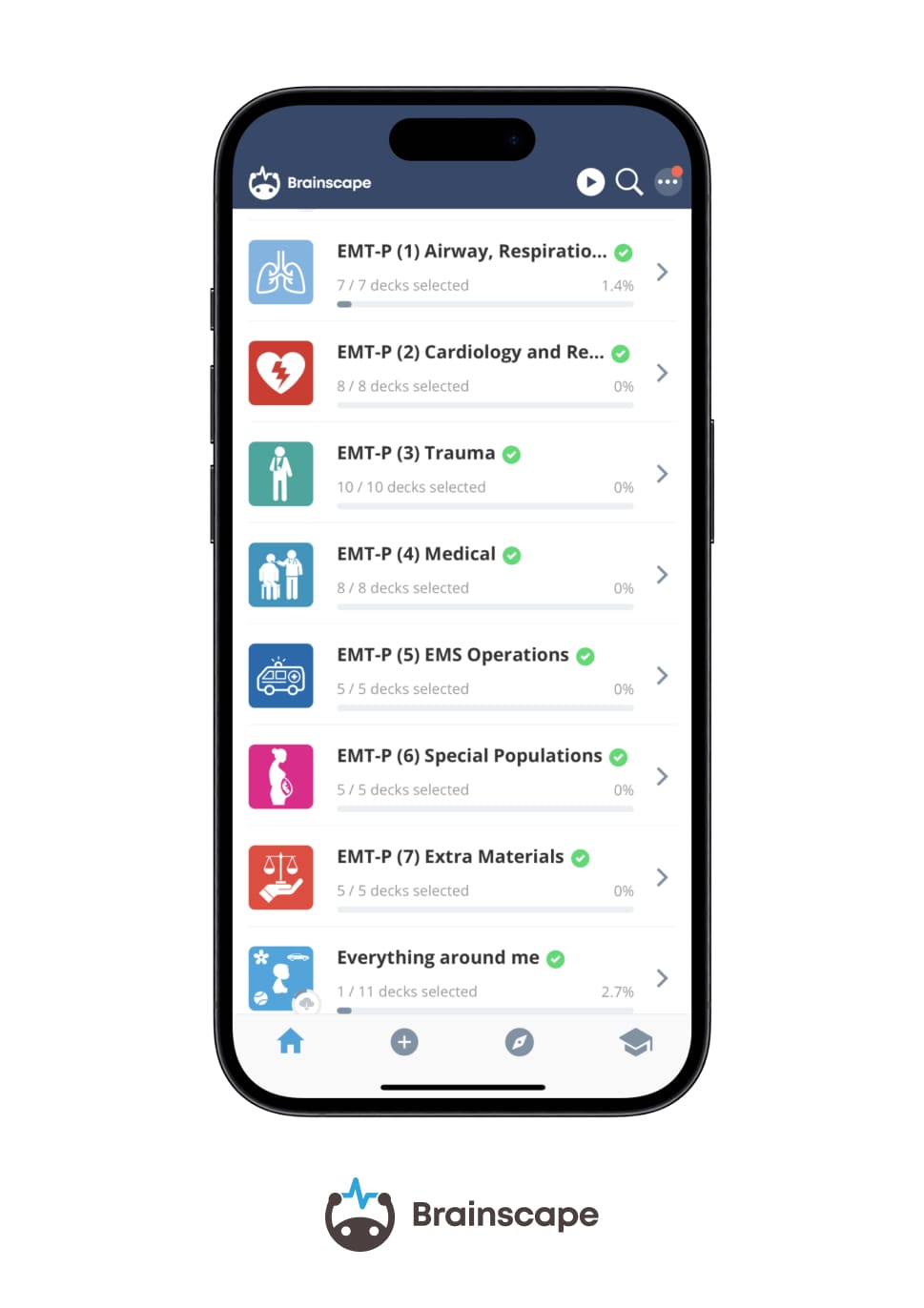Sweet, you’re a paramedic—or you’re training to become one—and you’ve landed here, upon the virtual pages of this guide, because you want to know how to take that all-important next step: applying for paramedic jobs.
Where should you start looking? How should you approach the job market? How can you best stand out as a candidate and really nail those paramedic job interviews? What’s the average paramedic salary look like, and what about projected job growth?
You have questions, I get it, and we’re here to answer them all in this paramedic study guide!
Where Can Paramedics Find Jobs?

The short answer is everywhere.
Wherever there’s a need for a skilled emergency healthcare professional, having a paramedic on staff and close at hand is more than just an asset: it could be life-saving. And so, the first employers that come to mind are ambulance services, hospitals, and emergency rooms, where paramedics serve the civilian population around the clock, responding to emergency calls and transporting patients to emergency rooms.
In fact, according to the Bureau of Labor Statistics, most paramedics (and EMTs) work in ambulatory healthcare. However, there are also paramedic jobs in a vast spectrum of other environments, which you should most definitely consider when deciding upon your career path:
- Dangerous workplaces like oil rigs, mines, power plants, etc.
- Professional sporting events and competitions
- Emergency search and rescue craft (ocean, air, wilderness)
- Army, Navy, and SWAT teams
- Fire department (firefighter paramedic)
- Large resorts, hotels, and cruise ships (i.e., where many people are gathered but hospitals may not be close at hand)
- Music festivals, concerts, and amusement parks
- Airplanes and helicopters (flight paramedics transport patients from more remote locations over long distances to an emergency room)
Important note: Some of these paramedic jobs require advanced training and certification, so make sure you look into those requirements beforehand. The take-home message, however, is that there are many exciting opportunities outside of the ambulance service.
How Can You Stand Out As A Paramedic Job-Seeker?

Now that your eyes have been opened to the broader range of paramedic jobs, let’s explore how you can place yourself in the best possible position as a candidate for them …
1. Network, Network, Network
This is true of any industry, but maintaining a network of positive relationships with other EMS and healthcare professionals is a fantastic asset to have when you’re looking for paramedic jobs. If you’re a new recruit, it may still take you some time to build this network, but even just through your training, tutors, and volunteer work, you should have met many people. Beyond the people you've met in the course of your training and practice, you could join a professional organization such as the American College of Paramedics. And you just never know who might one day introduce you to your next job opportunity!
2. Learn From Every Patient
Every patient is a learning opportunity. It’s the scaffolding of these learning experiences that makes you a better, more efficient paramedic. So, after delivering a patient to the ER, if possible, speak to the ER doctor or nurses to find out what was wrong with them afterwards. Was your assessment correct? Did you miss something? What could you do better in the future?
Pro Tip: It’s also a solid idea to learn every patient’s name and use it. It’s a small gesture that improves patient rapport and trust, but it can also become a useful diagnostic tool to assess breathing and brain function.
3. Be The Kind Of Partner You Would Want To Work With
If you’re efficient, helpful, patient, and attentive, you’ll earn a reputation as a valuable team member and a good person to work with. This positive relationship will help tremendously when you need, for example, references or recommendations for paramedic jobs.
Pro Tip: One surefire way to endear yourself to colleagues (and garner a positive reputation in the field) is to leave the rig better than you found it. Clean or organize something, do an inventory of the jump kit, or set up the pram for the next shift. You’ll be appreciated for taking care of your work environment.
4. Don’t Allow Your Skills To Lapse
It’s true that, over time, the skills and/or knowledge a paramedic doesn’t use very often will become rusty and fade from memory. And yet, a day will come when you need to administer it with practiced precision.
As such, it’s crucial that you keep your lesser-used skills and knowledge sharp. If you can’t practice with the gear you have at hand on the job, perhaps reach out to your paramedic training center to see if they’ll let you come in for a few hours to review your skills.
Then, to keep your knowledge fresh, use digital flashcards from an app like Memrise or Brainscape to drill yourself on the key facts you need to know. And when you come across a new learning point on the job, you can create a flashcard for it so that you don’t ever forget it!

6. Constantly Expand Your Knowledge And Practical Skills
The field of emergency medicine, technology, and healthcare is constantly evolving, so it’s an integral part of your career to remain abreast of these changes. Read research studies and published articles; work towards additional certifications; and keep up with “best practices” and technological advancements.
Current skills and certification are definitely criteria employers look for, so make sure you highlight that in your paramedic job applications.
7. Take Care Of Your Temple
Being constantly on the road and working odd shifts can lead to an unhealthy lifestyle—fast food, caffeinated beverages, too little sleep, etc. But if you’re to care effectively for your patients, you too need to be in good health. In fact, things like food, hydration, exercise, and sleep are crucial for brain health. As you know, brain health is crucial for making good decisions!
Another thing: if you feel the strain of the job on your mental health, seek counselling. Paramedics can see some pretty upsetting things on the job, and it’s better to cope with that stress with therapy, meditation, or some other healthy form of stress management than it is with medication (unless prescribed) or substance abuse.
How Can You Nail Your Paramedic Job Interview?

You’re a solid candidate, you’ve put in your applications for a few paramedic jobs, and now you’ve been called in for an interview. Now what? How can you make the best possible impression? Here’s your checklist!
Research the employer and role as best you can: They’ll be impressed if you demonstrate knowledge about them, which you can do by asking specific questions about their history, culture, etc., or by appealing to their interests or values.
Be clean and well-presented: This might sound obvious, but you’d be shocked how many candidates show up for interviews in sweat pants and a T-shirt (or maybe you won’t 😳).
Show up with questions: You’ll want to showcase your natural curiosity because paramedics need to be fast, critical thinkers. Also, paramedic job interviews go both ways! You should determine whether this job is a good fit for you, too.
Be friendly yet professional: You may feel nervous, which is perfectly normal, but try to convey confidence through a firm handshake, good eye contact, and a straight posture. Be friendly and smile, but maintain your professionalism.
Pro Tip: Employers typically look for positivity, strong communication skills, the ability to remain calm under pressure, compassion, empathy, and high energy.
Be up-front about any limitations you may have: It might be tempting to exaggerate your skills/experience in order to land your dream paramedic job, but it’s better to work up to that job than it is to have your knowledge or skills overestimated by your team and employer. In a crisis situation, that could become disastrous.
Practice your answers to common paramedic job interview questions: You’ll find tons of practice interview questions out there in the virtual ether (Google is your friend), so look them up and practice answering them.
For example: What kind of environments have you worked in as a paramedic? How do you manage stressful situations? How do you respond to a drug overdose call? How do you handle moving a heavy patient from a dangerous situation? And so on.
What Is The Average Annual Paramedic Salary?

Ah-ha! Let’s get down to brass tacks because discussions about paramedic salary often come up during job interviews—particularly if you’re called back for a second interview. So, what does a paramedic's salary look like? What benchmark should you establish for your career?
The median annual wage for paramedics across the United States is $58,000. This changes significantly between states, from a median wage of $45,020 in Alabama to $100,780 in Washington.
The answer depends on:
- Where in the world you work (country, state, and city),
- In what specific environment you seek employment (civilian, military, etc.),
- Who your employer is, and
- Whether they’re private or run by the state/federal government.
Use a job information database like Glassdoor or Indeed to view salary ranges in your area. Remember that starting salaries are typically below the estimated averages. However, you should have an idea of the minimum end of the expected pay range before entering an interview, as this will place you in a stronger position for negotiations.
A Final Thought On Applying For Your First Paramedic Job

We’ve covered the important bases here, from where you should look for paramedic jobs and how to stand out as a candidate to nailing your interviews and setting your salary expectations. Now, I have one final thought for you, particularly if you’re new …
The life of a paramedic—or anyone in EMS, for that matter—is one of lifelong learning. You’ll be learning constantly on the job; you’ll be picking up new techniques, skills, and equipment as medicine and technology advance; you’ll be refreshing your knowledge every two years for those important recertification exams, and you’ll (possibly) be learning and training for new certifications to advance your career.
The sooner you become comfortable with learning and develop strong daily habits to learn more efficiently, the better. Remember to maintain the habit of deliberately planned study time, and equip yourself with tools like digital flashcards to learn as efficiently as possible. You've got this!
Additional Reading
- EMT Jobs: how to get one and be successful!
- Paramedic vs nurse: what's the difference?
- How To Pass Your Paramedic Training & The NREMT-P Exam
References
About - American College of Paramedics. (n.d.-b). https://americanparamedics.org/home/about/
Paramedic salary guide. Nurse.org. (n.d.). https://nurse.org/healthcare/paramedic-salary/
U.S. Bureau of Labor Statistics. (2025, August 28). EMTs and Paramedics. U.S. Bureau of Labor Statistics. https://www.bls.gov/ooh/healthcare/emts-and-paramedics.htm
U.S. Bureau of Labor Statistics. (2024, April 3). Paramedics. U.S. Bureau of Labor Statistics. https://www.bls.gov/oes/2023/may/oes292043.htm
